Output and Activities
Here you can find work published as part of QUEERIT
Schmidt, Felix. “Narrating the Posthuman in Human Language – Marlen Haushofer’s The Wall (1963)” (Colloquium: Narrating Futures: Literature, Technology and Climate Discourse, Humboldt-Universität zu Berlin, 14-15 November 2025)
Schmidt, Felix. “trans nationality and trans diciplinarity – the Queer Canon in University Curricula” (Conference: Le canon littéraire à l'épreuve du tournant transnational, Universität Nantes, 2 October 2025)
Ali, Wassan. Panelist on “L*Ost DDR: Archiv-Talk - GrauZone Archiv und Spinnboden im Ost-West Dialog,” convened by Laura Matthäus (Spinnboden Lesbenarchiv Berlin, 28 March 2025)
Kilian, Eveline. “Queering Daphne du Maurier” (London Modernism Seminar, University of London, 1 March 2025)
Kurowicka, Anna. “Reimagining Asexuality: Theories of Asexuality Beyond Western Paradigms” (W.E.B. Du Bois Lecture Series, Humboldt-Universität zu Berlin, 4 February 2025)
Malinowska, Aleksandra. “The Socialist Legacy of the Combahee River Collective: Rereading Feminist Classics thought their Descendants” (MLA Annual Convention: Affect and Twenty-First-Century Feminist Manifestos, New Orleans, LA, 11 January 2025)
Schmidt, Felix. “‘Gerade du: nicht Fisch, nicht Fleisch!’ – Christa Wolfs Kassandra-Projekt als queerer Text” (Workshop: Queer Reading und Zeitlichkeit, Humboldt-Universität zu Berlin, 31 January 2025)
Ali, Wassan. Panelist on “Vorzeichen: Queering Libraries,” convened by Dr. Maha El Hissy (Goethe Institut in London, 13 November 2024)
Schmidt, Felix. “The Anthropocene – A Queer Time to be Alive” (Colloquium on Literature and the Anthropocene, Humboldt-Universität zu Berlin, 7-8 October 2024)
Ali, Wassan. Moderator and panelist on “Queere Archive: Wer oder was gehört (sich) da? - Gespräche über Queer of Colour Past, Present, and Future,” convened by Wassan Ali and Jessica Walter (Amerika-Gedenkbibliothek Berlin, 26 September 2024)
Kilian, Eveline. “The Political Implications of Writing the Self: Questions of Representation, Recognition and Memory” (on queer life writing) (Narratives of Democracy Workshop, University of Oslo, 9-10 September 2024)
Schmidt, Felix. “Die Frauen am Ida Berg – eine queere Utopie? Queere Zeitlichkeit in Christa Wolfs Kassandra-Projekt” (Tagung: Queere DDR-Literatur, Universität Regensburg, 20-21 June 2024)
Afken, Janin. “Lesbisch*-queere Utopien in der DDR-Literatur der 1970er Jahre (Irmtraud Morgner, Waldtraut Lewin, Helga Königsdorf)” (Tagung: Queere DDR-Literatur, Universität Regensburg, 20-21 June 2024)
Kilian, Eveline. “The Reception of Eve Kosofsky Sedgwick in the German Context” (Queer Theory in Transit Workshop, University of Warsaw, 20-22 May 2024)
Kilian, Eveline. “The Role of Different Media in Transgender Life Narratives: The Case of Kate Bornstein” (University of Warsaw, American Studies Centre, 23 April 2024)
Kilian, Eveline. “Bambi Reloaded: Isabel Waidner’s Queer Literary Universe” (Public Lecture, Humboldt-Universität zu Berlin, 18 April 2024)
Kilian, Eveline. “Investigating the Intersectional Complexities of Social Inequality: Queering Class” (Voicing Democracy Research Group, University of Oslo, September 2023)
Kilian, Eveline. “Entanglements of Class, Gender, Sexuality and Ethnicity: Some Literary Perspectives from Germany, Britain and France” (DAAD Summer School, King’s College London, 17-21 July 2023)
Schmidt, Felix. “No Time to Queer. The Reception of Queer Temporalities in Germany.” Open Gender Journal 9, 2025. https://doi.org/10.17169/ogj.2025.317
Kilian, Eveline. “Empowering Aesthetics: Queer Temporalities and Precarious Existence in Isabel Waidner’s Novels.” Reading Literature and Theory at the Intersections of Queer and Class. Ed. by Maria Alexopoulos, Tomasz Basiuk, Susanne Hochreiter and Tijana Ristic Kern. London and New York: Routledge, 2025, 40–52.
Kilian, Eveline. Participant in “Roundtable: Queer and Class in Theory and (Academic) Practice,” convened by Tamara Radak. Reading Literature and Theory at the Intersections of Queer and Class. Ed. by Maria Alexopoulos, Tomasz Basiuk, Susanne Hochreiter and Tijana Ristic Kern. London and New York: Routledge, 2025, 92–109.
Ali, Wassan. “Writing the Archive #2.” Zine on Intersectional Archiving and Queer (Un)belonging. Spinnboden Lesbenarchiv & Schwules Museum, 2024.
Ali, Wassan. “Lesbianism and the Language of Archiving.” Nicht die Ersten: Bewegungsgeschichten von Queers of Color in Deutschland. Ed. by Tarek Shukrallah, Assoziation A, 2024, 241-253.
Kilian, Eveline. “Gender-queere Perspektiven auf Raum-Zeit-Konstellationen in der Literatur: Virginia Woolfs Orlando.” IASL 2023; 48(2): 1–23. https://doi.org/10.1515/iasl-2023-0015
Reading Literature and Theory at the Intersections of Queer and Class: Class Notes and Queer-ies, edited by Maria Alexopoulos, Tomasz Basiuk, Susanne Hochreiter, Tijana Ristic Kern (Routledge, 2025)
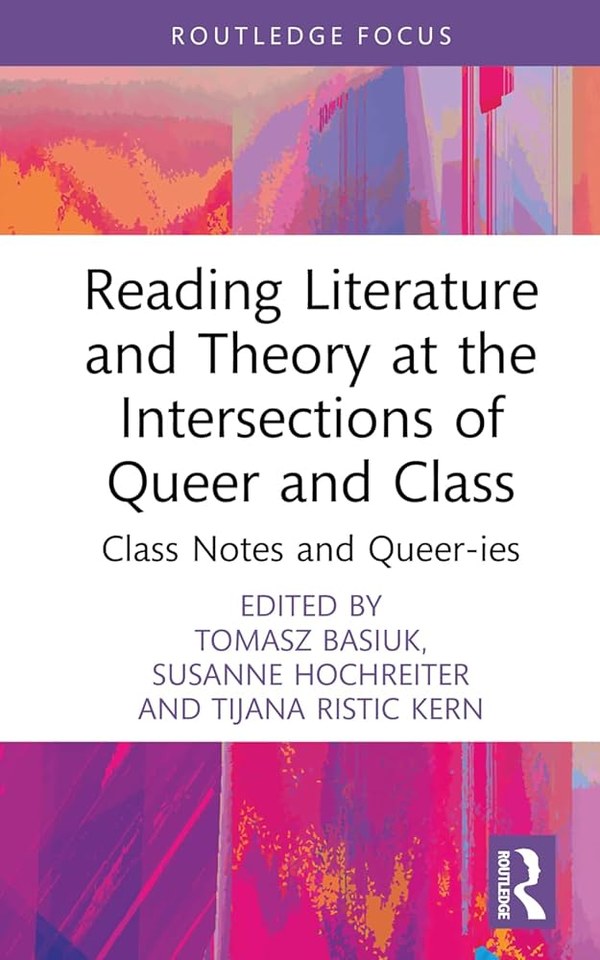
QUEERIT Project scholars and associated members published their first co-edited volume, which focuses on the crossover of queer and class, and examines a range of texts across languages and genres, and spanning nearly a century.
The collection considers the intersection of queer and class in relation to literary aesthetics, a locus in which the interaction between sexuality and class is rendered with lucidity. The authors combine research on class from cultural and literary studies with queer political and theoretical perspectives, and point to its activist as well as literary precedents and elaborations. Each chapter focuses on a reading of a literary text or set of texts, which represent a range of genres by U.S. American, British, German, and French authors: fiction, life writing, essays, and manifestos.
The authors read activist writing by U.S. lesbian feminists, as well as personal essays by U.S. gay men, focusing on the intersections between class and race in queer class politics. A chapter on Isabel Waidner, a German author living in the UK, another on Annie Ernaux remembering her deceased mother in her life writing, and a reading of Michelle Tea’s picaresque memoir, offer (queer) alternatives to linear, teleological narrative forms. A comparison between Hans Fallada’s canonical 1930s novel and Kristine Bilkau’s contemporary rendition of precariousness in the neoliberal age traces the development of social class categories and of sexual mores in Germany over the past century. Furthermore, a reading of dark academia considers the queer politics of a genre which romanticises the pleasures and privileges of academic life.
The eclectic selection of primary texts aims to offer multiple perspectives on queer and class, while acknowledging the impossibility of a comprehensive perspective. This diversity of genres and approaches to reading them – the differences between them and their partial overlaps – is reflected in the dialogue that unfolds in the final chapter, a roundtable panel with a focus on methodologies of queer and class-inflected analysis. In the Roundtable, the contributing authors and their colleagues discuss how the concepts of queer and class in theory and (academic) practice have informed their current and previous work.
Class Notes and Queer-ies emerged from a years-long collaboration of the research group Queer Theory and Literary Studies, established by several QUEERIT scholars and associated members from Humboldt-Universität zu Berlin, University of Vienna, and University of Warsaw, who have been meeting for regular workshops since 2017. The book is the product of the discussions and papers presented at these meetings, which culminated in three workshops held in 2022 and 2023, in Berlin, Warsaw, and Vienna, where the authors discussed the intersections of queer and class, workshopped each contribution, and conducted a two-part roundtable discussion. Like the current QUEERIT Project, Reading Literature and Theory at the Intersections of Queer and Class: Class Notes and Queer-ies is an example of queer academic collective praxis, and a testament to the importance of fostering small international research networks.
Contributors to the collection: Maria Alexopoulos (co-editor), Tomasz Basiuk (co-editor), Susanne Hochreiter (co-editor), Eveline Kilian, Karolina Krasuska, Anna Kurowicka, Ludmiła Janion, Julia Lingl, Naomi Lobnig, Krystyna Mazur, Tamara Radak, and Tijana Ristic Kern (co-editor).
The book will be available in Open Access beginning December.
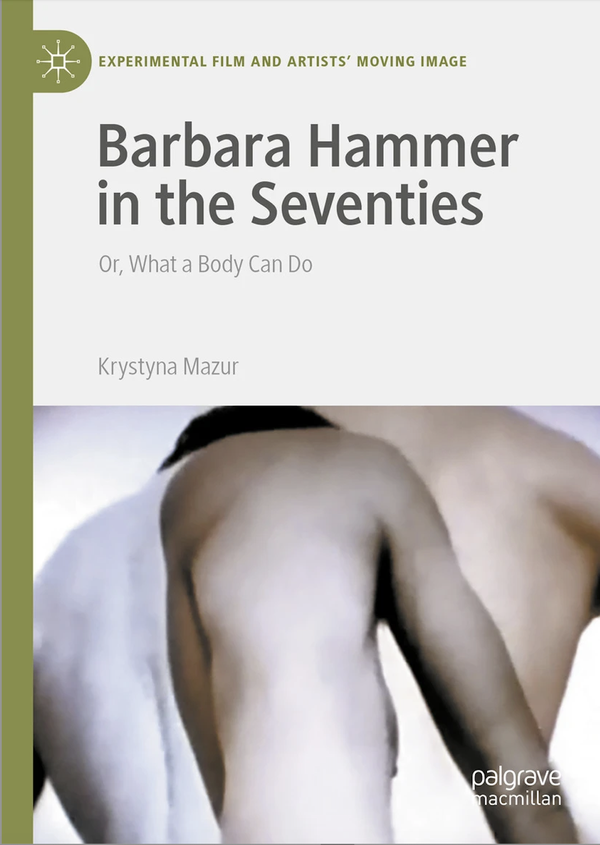
Barbara Hammer in the Seventies: Or, What a Body Can Do addresses the intersection of experimental film, lesbian sexuality, and the women’s movement in Hammer’s early films. Grounded in an embodied, sexual, and gendered positionality, these films interrogate the politics of visibility and identity and perform a discontinuous repertoire of lesbian images that resist the medium of film’s established constraints and the decade’s broader systems of signification.
Hammer’s films offer a critique of the dominant discourse that privileges the discreteness and self-sufficiency of the individualistic human subject. By performing the (lesbian) body in its ‘environment’—in erotic and communal relation to other bodies—and staging the relation of human bodies with the materiality of non-human beings and objects, they create a site of intervention into the humanist project, as it informs film studies, feminism, and queer theory.
This rereading of Hammer’s work offers an important contribution to conversations between feminism and queer studies. In remembering the feminist origins of queer studies, it recenters political and ethical questions such as the fundamental relationality of the subject, the subject’s dependency on others, and the resulting ethical responsibility for and towards the other.
Lesbische* Eigenzeiten: Temporalität in der feministischen* Literatur der DDR und BRD, 1971-1983 (roughly translatable as Proper Times: Temporality in West and East German Feminist* Literature, 1971-1983), by Janin Afken (transcript, 2024)
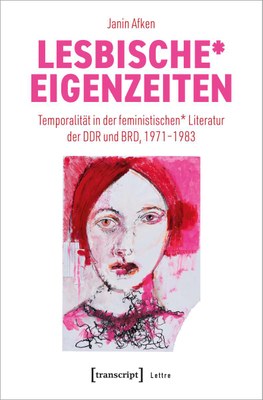
Janin Afken's book “Lesbische* Eigenzeiten” explores conceptions of time in 1970s West and East German lesbian*-feminist texts, which can be considered antecedents to concepts of queer temporality studies. According to the publisher's website, the book examines the following:
What role does temporality play in literature? Building on the sociological work of Helga Nowotny, Janin Afken is the first to apply the concept of »Eigenzeiten« to 1970s lesbian*-feminist* literature, which had previously been neglected in research. In a comparative analysis of six works from the FRG and the GDR, she focuses both on the performative construction of alternative (lesbian*) realities beyond the heteronormative-patriarchal economy of time as well as on the reflection of writing processes -- and expands on the portrayal of various time models within the framework of queer literary studies.
This volume stems from Tomasz Basiuk's earlier work on the queer seventies but includes his essay on Eve Kosofsky Sedgwick’s Polish reception and translation, reflecting his primary focus in the QUEERIT project. According to the publisher's website, the book examines the following:
Histories of homosexual identity in Poland and other countries of the Eastern Bloc usually begin in late 1980s, with the emergence of first periodicals aimed at nonheteronormative readers and (informal) organizations fighting for their rights. The authors of this book look at what was before that – studying everyday life, expert discourses, literature, art and social networks, and comparing the situation in Poland with examples from both sides of the Iron Curtain. In their search for signs of emancipation of LGBTQ+ people and for mechanisms standing in its way they are aided by the concept of sexual citizenship, based on a broad definition of citizenship as a sense of belonging in terms of culture and identity along with the enjoyment of full rights.
Kruche jest piękne: Męskości w polskiej prozie emancypacyjnej po 1989 roku (in English: Fragile Is Beautiful: Masculinities in Polish emancipatory fiction after 1989), by Przemysław Górecki (Wydawnictwo UMK, 2024)
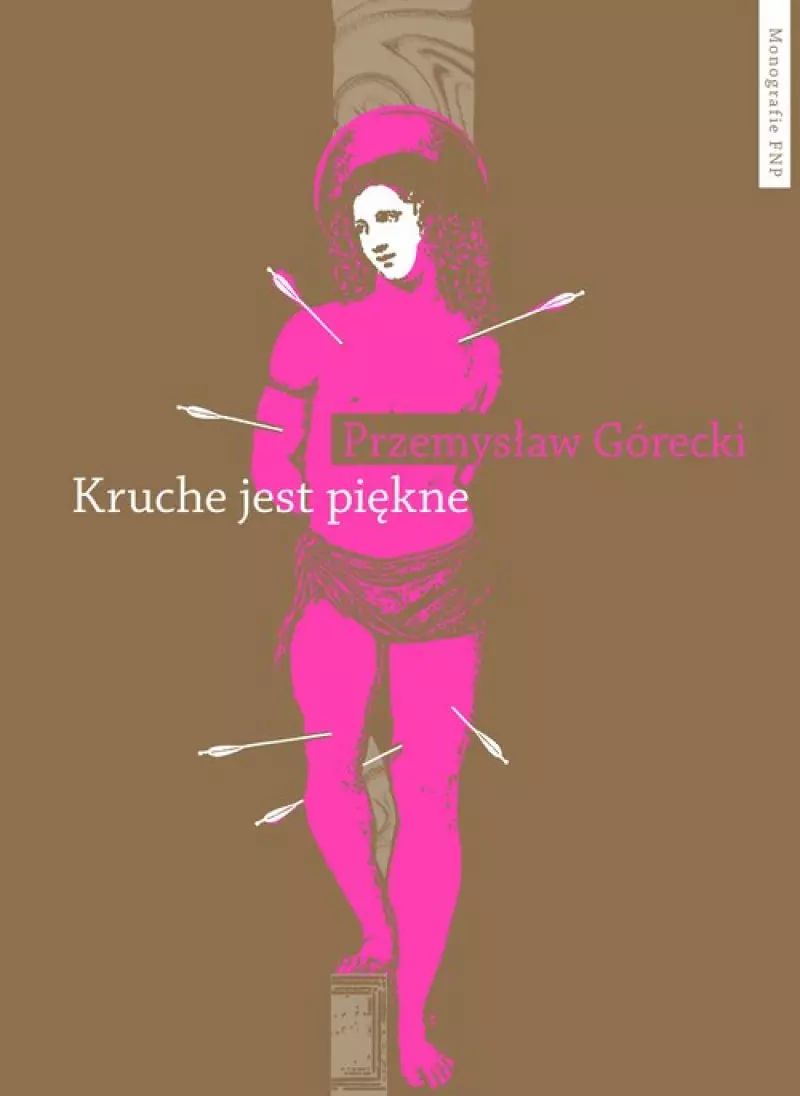
Masculinity does not exist. Understand it or get bogged down in the passionate machine of producing false meanings, reproducing clichés and thoughtlessly issuing prescriptions for misdiagnosed diseases.
Masculinity is fiction – also literary fiction. And like any fiction, it transforms elements of the real world, although it creates a simulacrum out of them, and even forms its own extremely oppressive reality. If we multiply something that does not exist, our reality will be filled with a multitude of masculinities. Will they still mean anything?
The story of how an all-and-nothing concept is masculinity, pluralized as almost everything in a world which has already coped with the comfortable illusion of community and universalism, can be told on basis of a variety of cultural texts. In this book, the language of the story is literary studies, and the protagonists are a sizable group of literary texts and the characters appearing on their pages.
“Fragile is Beautiful. Masculinities in Polish emancipatory fiction after 1989” is a story about how Polish literature has used the concept of masculinity in the last three decades and what extra-literary processes in the country and the world this was a result of. The dynamic period of Poland’s recent history initiated by the 1989 political transformation opened a window for domestic literature, behind which a whole new landscape of cultural transformations was outlined, with the boundaries of what is masculine and feminine. The panorama of emotions and experiences available to us stretches to the horizon, but for some reason it is not the sky, but the commonly accepted norms of gendered expression that are the limit. How does Polish contemporary prose attempt to respond to the oppressive norms and conventions into which masculinity forces its protagonists? What proves necessary is such an approach which reflects not upon a single masculinity, but its various forms and the dynamic relations between them. The book proposes such a reading of a dozen literary narratives – a blueprint for a reading whose starting point is the rejection of the generic transparency which accompanies masculinity.
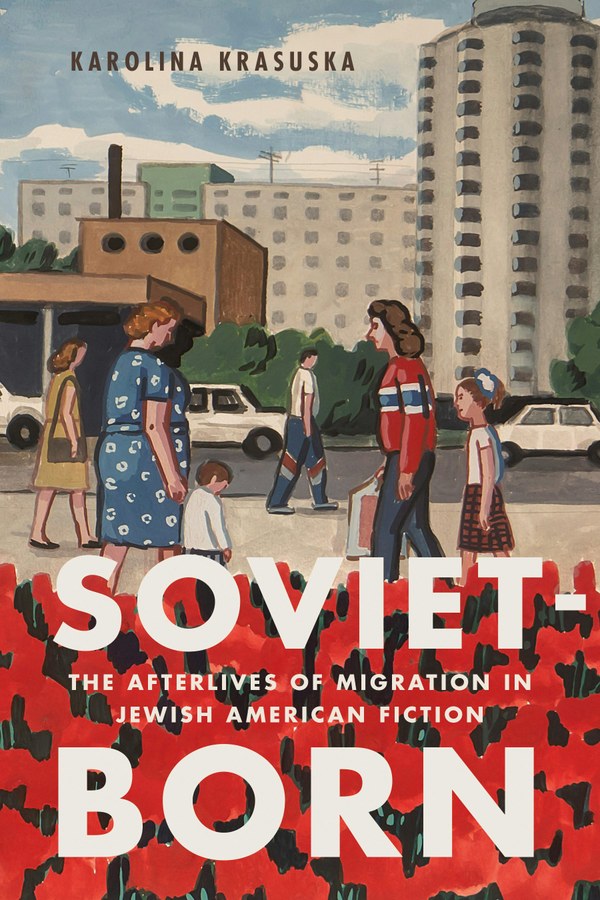
Karolina Krasuska's book addreses transnationality as linked to migration in a manner analogous to QUEERIT’s interest in Said’s traveling theory as a blueprint for the dissemination and reception of queer theory across national borders. According to the publisher's website, the book examines the following:
In 2010, when The New Yorker published a list of twenty writers under the age of forty who were “key to their generation,” it included five Jewish-identified writers, two of whom—American Gary Shteyngart and Canadian David Bezmozgis—were Soviet-born. This publicity came after nearly a decade of English-language literary output by Soviet-born writers of all genders in North America. Soviet-Born: The Afterlives of Migration in Jewish American Fiction traces the impact of these now numerous authors—among others, David Bezmozgis, Boris Fishman, Keith Gessen, Sana Krasikov, Ellen Litman, Gary Shteyngart, Anya Ulinich, and Lara Vapnyar—on major coordinates of the Jewish American imaginary.
Entering an immigrant, Soviet-born standpoint creates an alternative and sometimes complementary pattern of how the Eastern and Central European past and present resonate with American Jewishness. The novels, short stories, and graphic novels considered here often stage strikingly fresh variations on key older themes, including cultural geography, the memory of World War II and the Holocaust, communism, gender and sexuality, genealogy, and finally, migration. Soviet-Born demonstrates how these diasporic writers, with their critical stance toward identity categories, open up the field of what is canonically Jewish American to broader contemporary debates.
